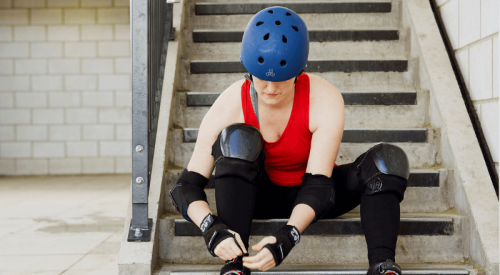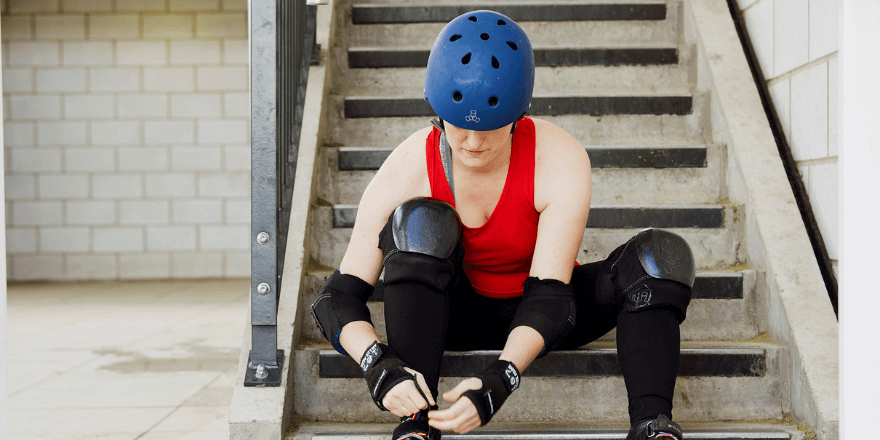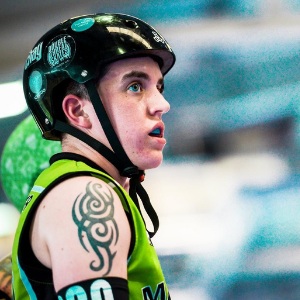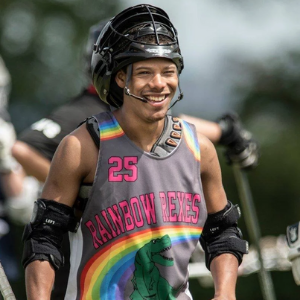
6 sports getting LGBTQ+ inclusion right

We want to highlight some of the sports that are striving to build visibility and inclusion for LGBTQ+ people.
We can’t make sport everyone’s game unless all LGBTQ+ people are accepted, respected and celebrated, no matter what sport they’re part of or what level they play at.
These sports are leading the way on LGBTQ+ inclusion and showing that it’s not that hard to get it right! You can play your part by taking inspiration from these six incredible sports and signing your club or sports organisation up to our LGBTQ-inclusion workshops.
1. Roller Derby

Photo: John Hesse
Chay (he/him), told us the ways that Roller Derby is LGBTQ+ inclusive. “When I took up roller derby, I was openly LGBTQ+ but was yet to come out as trans. At the time I often felt like the ‘odd one out’ at work, when doing sports, and at social events. That feeling lifted whenever I went to roller derby training because there was a real mixture of LGBTQ+ and non-LGBTQ+ people.
And that’s what finally gave me the confidence to come out as a trans man. When I moved to train with the local men’s team, I was nervous. But I had nothing to be nervous about – I was welcomed with open arms and there was another trans man and a non-binary person on the team too.”
2. Cricket
Cricket has shown its dedication to LGBTQ+ inclusion across multiple levels of the sport. In 2019, England men’s captain Joe Root made headlines by calling out homophobia live on Sky Sports. Later that year women’s World Cup winning players Katherine Brunt and Nat Sciver announced their engagement.
These high-profile moments are not isolated incidents but evidence of what happens when a sport works hard to create environments where its participants can thrive. The England and Wales Cricket Board (ECB) is part of Stonewall’s Diversity Champion scheme and the charity Chance to Shine are pushing for inclusivity through their Street programme, and are in the process of writing their first ever equity, diversity, and inclusion strategy. It takes everyone’s efforts to create sports where everyone thrives.
In 2021, the ECB and the wider game will be celebrating Rainbow Laces for the fourth time, and is also due to march at London Pride. It comes in a year which saw what was believed to be the first wholly inclusive LGBTQ+ game of cricket, between Graces CC and Unicorns CC.
3. Parkour
ParkourUK consulted with members on intersectional inclusion in 2020. This included working with groups focused on race equity, women and girls participation as well as LGBTQ+ inclusion. Working closely with members to create change is so vital. We are very much looking forward to seeing where Parkour goes next!
4. Shorinji Kempo
This form of martial arts isn’t in the Olympics (yet), but that’s not stopping it from working towards inclusion for all LGBTQ+ people. The British Shorinji Kempo Federation has recently updated its registration forms with trans inclusive language, individual clubs are working together with accessibility consultants to ensure disabled athletes can thrive in the sport.
Shorinji Kempo has shown us that change is most collaborative and effective when governing bodies are open to learning from the progressive work that club leaders are doing at community level.
5. Quidditch
Quidditch prides itself as being a sport for all people, no matter your body type or gender. It is a mixed sport, with a rule book that from its very inception in the late 2000s has been inherently inclusive of trans and non-binary players. There is a position for everyone, whether you are strong and powerful; fast and endurance-driven; or agile and perceptive. The Quidditch World Cups have celebrated LGBTQ+ players from multiple countries.
6. Lacrosse

Photo: the Rainbow Rexes
Lacrosse is the Creator's Game and was played by indigenous people of North America for centuries before being introduced elsewhere. The game remains culturally significant for First Nations players, particularly Iroquois and Haudenosaunee. People involved in lacrosse are working hard to grow the game in the UK beyond private schools, and in doing so engaging with race equity and trans-inclusive partners.
The European Lacrosse Federation is currently working with trans and non-binary players across Europe to introduce trans inclusion guidance that allows players to thrive both within and outside traditional women’s/men’s categories, with mixed gender lacrosse growing significantly in recent years.